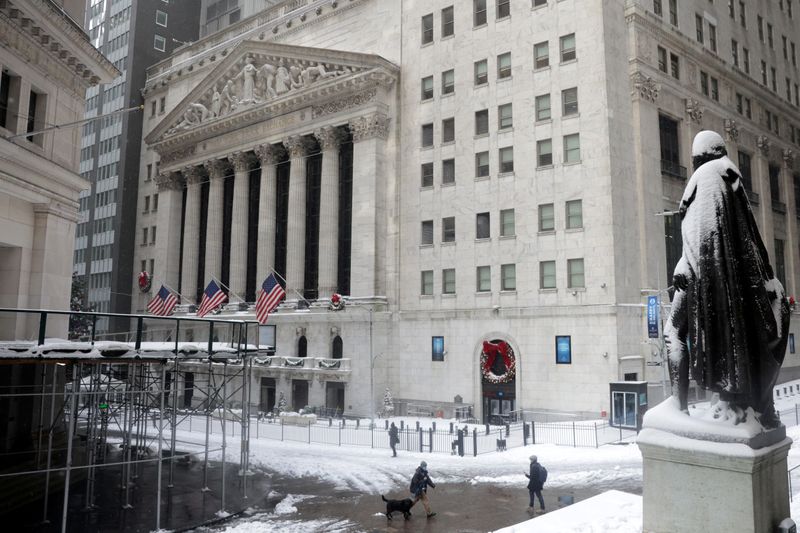By John McCrank, Ross Kerber and Alun John
NEW YORK/BOSTON/HONG KONG (Reuters) - Financial executives are settling in for the long haul over the Trump administration's investment ban on Chinese securities, expecting the rules to be lasting but hoping to have more clarity after President-elect Joe Biden takes office.
Trump's executive order requires U.S. investors to completely divest from the securities of 44 companies deemed to be linked to the Chinese military.
Confusion over the order, which has been amended and interpreted via different guidance from separate agencies, has roiled Asian markets, led financial institutions to purge potentially affected companies from funds and asset managers to sell positions at depressed prices.
With the sanctions effectively kicking in after Biden takes office, financial professionals are waiting to see how he handles the issue, but expectations are low that he will reverse course, leaving investors worried their access to China's vast capital market and huge economy will be increasingly restricted.
Some of the confusion stems from deep divides within the Trump administration over the approach on China, with Treasury Secretary Steve Mnuchin seen as taking a more dovish view on Beijing but the State Department more hardline, according to current and former government officials.
Biden officials declined to comment.
"There's unlikely to be immediate, dramatic changes, only because the current political climate will not encourage him to make changes," said Franklin Chu, president of Sage Capital.
That sentiment was shared by more than half-a-dozen financial professionals interviewed by Reuters.
"We are going to move forward as though this order is going to be in place for a long time," said a senior executive at a large U.S. trading platform, who declined to be named, as did several others, because of the topic's political nature.
One source familiar with the views of three U.S. banks said the institutions doubt Biden will reverse, or significantly ease, the ban anytime soon.
With the coronavirus raging, the economic recovery waning, and bipartisan support for a tough approach toward China, backing down on a ban aimed at curbing Chinese military expansion is unlikely to be a priority, several executives said.
"There is very little chance the incoming Biden administration in the early days uses what political chips ithas to anything construed as being weak on China," said LelandMiller, CEO of U.S.-based consultancy China Beige Book.
ADMINISTRATIVE KERFUFFLE
Confusion over the rules was evident last week when the New York Stock Exchange said it would delist three Chinese telecoms included in the order as of Jan. 11, backtracked, then made another U-turn after Mnuchin called NYSE President Stacey Cunningham to object.
The NYSE's general counsel later held a call with hundreds of market participants looking for answers on the about-face, many of whom were unsatisfied with what they heard, said a lawyer who had several clients on the call.
The NYSE declined comment.
In a bid to clarify the rules, the Treasury on Thursday issued a general license exempting U.S. securities exchanges from the investment ban for transactions with newly blacklisted Chinese companies for a full year from the date of their addition to the list.
The rules so far have "been perceived as pretty ad hoc andreactionary, so the industry has been forced to scramble," said Dan Hanson, chief investment officer of Ivy Investments of Kansas City, who hopes "the administrative kerfuffle will be improved in the coming months."
Trump signed the order in November, but there was confusion over which securities were included. More securities were added to the list in December and more earlier this week.
"I would certainly hope that there would be better guidancecoming out" from Biden, said a U.S. stock exchange executive.
Investors expressed relief when Chinese behemoths Alibaba (NYSE:BABA) , Baidu (NASDAQ:BIDU) and Tencent were not added to the list, as Reuters reported was being considered, but uncertainty remains high.
"This is forcing investors to sell now while they still can," said David Loevinger, a managing director at TCW Group.
The rules have also caused confusion in Hong Kong, where a large exchange-traded fund on Wednesday resumed investing in stocks banned under the order two days after saying it would stop doing so, because neither it nor the manager of the fund, State Street (NYSE:STT) Global Advisors Asia, are "U.S. persons." Until there is more clarity, many investors say they will avoid anything that might get ensnared by the rules.

"It's just an area in an issue that I'd rather not be exposed to today... until we know what the ground rules are," said Jim Warner, managing director at Lear (NYSE:LEA) Investment Managementin Dallas.
